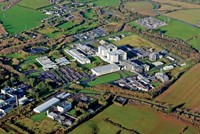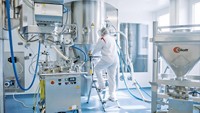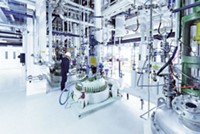Advertisement
Grab your lab coat. Let's get started
Welcome!
Welcome!
Create an account below to get 6 C&EN articles per month, receive newsletters and more - all free.
It seems this is your first time logging in online. Please enter the following information to continue.
As an ACS member you automatically get access to this site. All we need is few more details to create your reading experience.
Not you? Sign in with a different account.
Not you? Sign in with a different account.
ERROR 1
ERROR 1
ERROR 2
ERROR 2
ERROR 2
ERROR 2
ERROR 2
Password and Confirm password must match.
If you have an ACS member number, please enter it here so we can link this account to your membership. (optional)
ERROR 2
ACS values your privacy. By submitting your information, you are gaining access to C&EN and subscribing to our weekly newsletter. We use the information you provide to make your reading experience better, and we will never sell your data to third party members.
Business
Hikal Branches Out
Indian fine chemicals manufacturer sets up contract research arm
by Rick Mullin
November 2, 2009
| A version of this story appeared in
Volume 87, Issue 44

Despite worries over supply-chain security after incidents of contaminated drugs from Asia last year, most major pharmaceutical companies insist that proven players in India and China will remain a fixture in their active pharmaceutical ingredient (API)-outsourcing strategies. Indian suppliers are particularly well established in the sector, and many had a large presence at CPhI, the pharmaceutical ingredients conference, in Madrid last month.
In fact, the field has become competitive, with firms such as Piramal Healthcare taking positions among the top global contract manufacturers. As in the U.S. and Europe, companies in India are jockeying to offer what they perceive as an ideal spread of services along the drug development continuum from discovery to commercialization.
Hikal, a contract fine chemicals firm with headquarters in Mumbai, is responding to the competition by expanding its services into contract research and kilogram-scale manufacturing, according to Anish Swadi, vice president of business development.
Last year, Hikal launched an independent subsidiary called Acoris Research, in Pune, India, about 140 km from its headquarters. With eight synthetic chemistry labs, an analytical lab, and a kilolab facility operating to the U.S. Food & Drug Administration's current Good Manufacturing Practice standards, Acoris is offering the kind of "hit to lead" research that drug firms traditionally did in-house and that other Indian players such as Dishman Group and Jubilant Organosys now offer as a service, Swadi says.
Although Swadi and his colleagues hope that research contracts will lead to manufacturing deals, he says Hikal elected to run Acoris as a separate corporate entity. "A lot of potential customers may already have manufacturing tie-ins to other contractors, and others are concerned about patent protection," he says. "We wanted to set up a firewall between contract research and manufacturing."
With about 100 employees, Acoris already has 10 projects under way with both large and start-up pharmaceutical companies. It also has a contract with Pittsburgh-based Plextronics to manufacture chemicals for organic light-emitting diodes.
Running two separate businesses reflects concerns among some U.S. and European drug companies about protection of intellectual property in India, Swadi acknowledges. Yet he points out that Hikal has had successes—including contracts with Pfizer, Bayer CropScience, and Alpharma—that should help build the contract research subsidiary.
"Getting Western business is about achieving a level of satisfaction and comfort," Swadi says. "Our track record with big pharma on the manufacturing side will lead us to contracts for Acoris. Our respect for intellectual property rights is tremendous."
According to Enrico Polastro, a consultant with Arthur D. Little in Brussels, Indian suppliers in general have been moving up the value chain. "They are going beyond simply supplying headcount and reactor capacity to also offering value-added services," he says. "You will notice that Indian companies' booths at CPhI have signs that are no longer about products but about a broad range of capabilities."
Hikal, a long-time player in agricultural chemicals, has been pushing to boost its pharmaceuticals business with U.S. and European clients, according to Polastro. He notes that the president of Acoris, R. Helmut Rupp, is a former research executive at Lonza.
Swadi says Acoris plans a second phase of building in Pune to increase both research and kilolab-manufacturing capacities. "Hopefully, the financial environment will improve by next year," he says. "Once we have the orders in hand, we will build phase two."





Join the conversation
Contact the reporter
Submit a Letter to the Editor for publication
Engage with us on Twitter